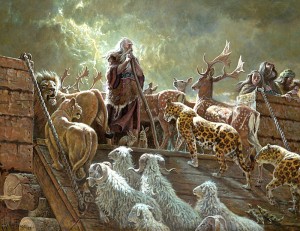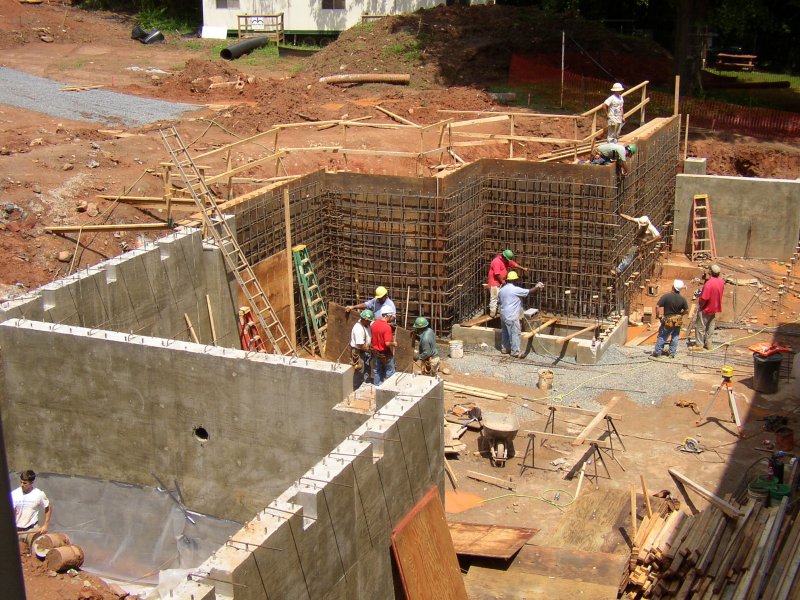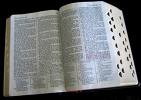Q. What do Mormons believe about the Flood?
Let me introduce to you Figure 1.

We Mormons believe in Figure 1. While certainly the artist took some creative license in recreating this scene (who ever said Noah had a giant staff?), the basic idea that it conveys is real. There was a man named Noah who gathered up a bunch of animals, put them on an ark, and then weathered one crazy storm with the miraculous help of God.
We also believe in science. For years I was a TA for physics classes at my university where I would teach everything from F=ma to quantum mechanics. I am currently working on a project for NASA that requires using more science than any grown man should ever have to use. With this background I know that there are equations and models that we’ve derived from our objective view of the universe that work. That is, we have discovered laws and theories that, as far as we know, accurately predict how our universe functions.
Sometimes science seems to butt heads with religion. Noah and the Flood is one of times. Many geologists discount the Biblical narrative of Noah as being improbable and not scientifically sound. This is fine by me. I do not need science to prove my belief in the Bible. There are many things I believe in that science can’t prove. How can people be resurrected after they have died? How can heavenly messengers such as angels defy Newton and his apple? How do miracles occur? I have chosen to place my ultimate confidence in God, not in the models and equations of science, which, in just the last couple hundred years alone, have been shown to change time and again as new experiments are performed.
The argument that geologists give that the Flood never really occurred is based on a few underlying assumptions that are important to understand. First, the concept of uniformitarianism which assumes that the natural processes that we observe occurring in our world today are the same as those operating in the past. That is, the geologic processes scientists have tracked over the last few hundred years are sufficient to predict what has happened to the earth over the past millions of years.
Another bold assumption is that God doesn’t exist. This assumption conveniently gets rid of Moses parting the Red Sea and the earth ever being modified in any unnatural way. I refute this assumption, believing Christ’s words, “If ye have faith as a grain of mustard seed, ye shall say unto this mountain, Remove hence to yonder place; and it shall remove; and nothing shall be impossible unto you” (Matthew 17:20).
I love the Bible. I know it to be the word of God. Its teachings (especially those of Christ) lead us to God and to a happier, fuller life. Science can’t always promise that.
Further reading: “The Flood and the Tower of Babel”, “The Gospel and the Scientific View: How Earth Came to Be”
 I will never forget the day that the Holy Ghost witnessed to me that Joseph Smith truly did see Heavenly Father and Jesus Christ and that through him the fulness of the Gospel of Jesus Christ has been restored. It had been a rough few days. At the time I was spending 8-10 hours a day learning a language that was so foreign to me (Russian) and I was suffering from immense feelings of inadequacy. I was faced with the realization that I had left everything that was familiar to me for two entire years; I felt isolated and completely alone. I realized for the first time that I wasn’t as tough or as smart as I thought I was, I felt that I was a little child again. In addition to learning Russian, I was also learning how to teach. Part of this learning process included teaching various principles of the Gospel. Of course, I didn’t know what I was teaching verbatim, so I was reading and teaching it to my colleagues. I came to Joseph Smith’s account of what he saw on that spring day of 1820 in a grove of trees near Palmyra, New York:
I will never forget the day that the Holy Ghost witnessed to me that Joseph Smith truly did see Heavenly Father and Jesus Christ and that through him the fulness of the Gospel of Jesus Christ has been restored. It had been a rough few days. At the time I was spending 8-10 hours a day learning a language that was so foreign to me (Russian) and I was suffering from immense feelings of inadequacy. I was faced with the realization that I had left everything that was familiar to me for two entire years; I felt isolated and completely alone. I realized for the first time that I wasn’t as tough or as smart as I thought I was, I felt that I was a little child again. In addition to learning Russian, I was also learning how to teach. Part of this learning process included teaching various principles of the Gospel. Of course, I didn’t know what I was teaching verbatim, so I was reading and teaching it to my colleagues. I came to Joseph Smith’s account of what he saw on that spring day of 1820 in a grove of trees near Palmyra, New York: As I spoke these words, it was like there was a fire in my body, even to the point that I wondered if it could consume me. My heart was burning so strongly and I was so overcome with a feeling of peace that tears flowed freely from my young eyes. I knew that it was the Holy Ghost bearing witness to me that what I was teaching was true. It was so powerful that there was no room for doubt in my mind any longer and I knew that it was from God. The language still wasn’t easy and it was still hard learning to adapt to my new situation, but I pressed forward with a sure conviction that The Church of Jesus Christ of Latter-Day Saints is Jesus Christ’s church. (As an aside, I hope that you can now understand why Mormons believe so strongly in their religion. One cannot deny that an experience such as the one that I had is from God.)
As I spoke these words, it was like there was a fire in my body, even to the point that I wondered if it could consume me. My heart was burning so strongly and I was so overcome with a feeling of peace that tears flowed freely from my young eyes. I knew that it was the Holy Ghost bearing witness to me that what I was teaching was true. It was so powerful that there was no room for doubt in my mind any longer and I knew that it was from God. The language still wasn’t easy and it was still hard learning to adapt to my new situation, but I pressed forward with a sure conviction that The Church of Jesus Christ of Latter-Day Saints is Jesus Christ’s church. (As an aside, I hope that you can now understand why Mormons believe so strongly in their religion. One cannot deny that an experience such as the one that I had is from God.)


 That Sunday church service is designated for witnessing or bearing testimony of the truthfulness of the gospel of Jesus Christ by the members of the congregation. Besides abstaining from food and drink and attending testimony meeting, a true fast also consists of giving a fast offering to care for those in need. The offering, the sum of money that would have been spent on the two skipped meals, is given to the Bishop for any members who are struggling.
That Sunday church service is designated for witnessing or bearing testimony of the truthfulness of the gospel of Jesus Christ by the members of the congregation. Besides abstaining from food and drink and attending testimony meeting, a true fast also consists of giving a fast offering to care for those in need. The offering, the sum of money that would have been spent on the two skipped meals, is given to the Bishop for any members who are struggling. Isaiah notes the spiritual benefits and lists them in the 58th chapter of his book. When we obey the law of the fast he says, “Then shall thy light break forth as the morning, and thine health shall spring forth speedily: and thy righteousness shall go before thee; the glory of the Lord shall be thy rereward [or rearguard]. Then shalt thou call, and the Lord shall answer; though shalt cry, and he shall say, Here I am.” We are promised better health, protection, that we will be closer to the Spirit of the Lord and that the Lord will hear and answer our prayers.
Isaiah notes the spiritual benefits and lists them in the 58th chapter of his book. When we obey the law of the fast he says, “Then shall thy light break forth as the morning, and thine health shall spring forth speedily: and thy righteousness shall go before thee; the glory of the Lord shall be thy rereward [or rearguard]. Then shalt thou call, and the Lord shall answer; though shalt cry, and he shall say, Here I am.” We are promised better health, protection, that we will be closer to the Spirit of the Lord and that the Lord will hear and answer our prayers.
 When I lived in Uganda last summer I fasted for a number of reasons. I went there to do humanitarian work and “change the world!” I wanted Heavenly Father to show me what I could do that would make the most meaningful impact on the people I worked with. Thinking I could change things or fix problems was incredibly prideful, but I really wanted to make a difference. The biggest difference, of course, was with myself. The scriptures tell us to feed the hungry, heal the sick, clothe the naked, etc., but I have never seen such practical application in my life. Everyone I knew in the U.S.A. had at least five pairs of shoes, plenty of food in the pantry and access to medical attention, but in Lugazi? No. It was while I was walking up and down dirt roads, having little kids who wore the same shirt everyday run up in their bare feet and grab my hands that I realized why we are asked to fast. Not everyone can have the experience I did in East Africa, but fasting gives people everywhere that little taste of discomfort that is so common around the world. It helps us to realize that there is so much work for us to do while Christ is away.
When I lived in Uganda last summer I fasted for a number of reasons. I went there to do humanitarian work and “change the world!” I wanted Heavenly Father to show me what I could do that would make the most meaningful impact on the people I worked with. Thinking I could change things or fix problems was incredibly prideful, but I really wanted to make a difference. The biggest difference, of course, was with myself. The scriptures tell us to feed the hungry, heal the sick, clothe the naked, etc., but I have never seen such practical application in my life. Everyone I knew in the U.S.A. had at least five pairs of shoes, plenty of food in the pantry and access to medical attention, but in Lugazi? No. It was while I was walking up and down dirt roads, having little kids who wore the same shirt everyday run up in their bare feet and grab my hands that I realized why we are asked to fast. Not everyone can have the experience I did in East Africa, but fasting gives people everywhere that little taste of discomfort that is so common around the world. It helps us to realize that there is so much work for us to do while Christ is away.
 I gained my first witness that the Church of Jesus Christ of Latter-day Saints is true at a very young age. I was about three or four years old and one night as I was lying in bed, my mind started wandering and speculating and the thought occurred to me, “What if my parents and church leaders are wrong? What if there really is no life after death? What then? What if they’re just mistaken?” The response was immediate. No sooner had I begun to mull over this possibility than I felt an overwhelming sense of peace engulf me. I felt the reassurance of the Holy Ghost testifying to me that I needn’t worry about such a possibility because such is simply not the case. My parents and teachers
I gained my first witness that the Church of Jesus Christ of Latter-day Saints is true at a very young age. I was about three or four years old and one night as I was lying in bed, my mind started wandering and speculating and the thought occurred to me, “What if my parents and church leaders are wrong? What if there really is no life after death? What then? What if they’re just mistaken?” The response was immediate. No sooner had I begun to mull over this possibility than I felt an overwhelming sense of peace engulf me. I felt the reassurance of the Holy Ghost testifying to me that I needn’t worry about such a possibility because such is simply not the case. My parents and teachers 
